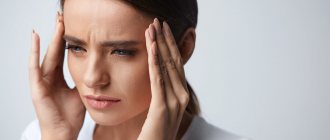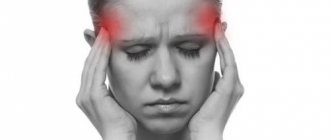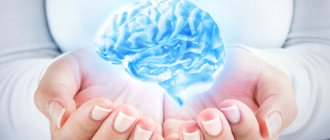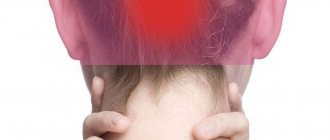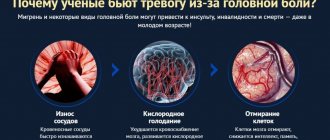Headache is a common complaint of almost any modern person. Quite often the best cure for it is sleep. However, some people also experience headaches at night. Why does it occur and how can it be dealt with?
Snoring, apnea, insomnia or other problems? Contact the Sleep Medicine Center at the Rehabilitation Clinic in Khamovniki. We will definitely help you! Ask questions and schedule a consultation by phone.
Causes of night headaches
Pain that appears in the evening or at night and lasts almost until the morning needs to be determined so that the prescribed treatment is effective and, if possible, short-lived.
So, the main causes of such pain include:
- general tension or stress;
- tension of the soft tissues of the head;
- brain tumors;
- cervical osteochondrosis;
- shortness of breath, interruption of breathing;
- intracranial pressure, deterioration of blood flow in the vessels;
- recent concussion;
- infections, etc.
Examination methods
Diagnosis of headaches is carried out using complex techniques, tests and equipment. A simple examination is not enough to determine the cause of morning discomfort and poor health.
The doctor may prescribe a set of examinations, which include:
- blood tests are a way to determine viral and bacterial infections, hormonal disorders, poisoning, vitamin imbalances and other diseases;
- Ultrasound, cardiography - methods of examining the heart to identify defects, disturbances of heart rhythm and conduction, congenital and acquired structural anomalies;
- Dopplerography - ultrasound diagnostics of blood vessels using a contrast agent, prescribed if insufficient blood supply to the brain is suspected;
- MRI of the head and neck is an informative diagnostic method for identifying neoplasms, acute and chronic diseases, and examining the cervical spine.
Why at night?
At night, the human body works differently than during the day. He is more relaxed, the metabolic and restoration processes work practically without external irritants. Therefore, malfunctions in the human body and brain manifest themselves more clearly, more intensely - in the form of pain. This is a kind of signal that not everything is in order and measures need to be taken. Therefore, it is strongly recommended not to simply endure the pain, drowning it out with analgesics or using sleeping pills.
Night pain can be especially dangerous if it is accompanied by dizziness; worse when sneezing, coughing; if you notice the system in their appearance (for example, at a certain time of the night); if they roll on suddenly and very strongly. With such night headaches, it is better not to delay treatment!
A special case is night migraine. Many people are familiar with these long and frequent pains in the head, for which there are no apparent reasons. Moreover, migraine can be inherited, most often through the female line. Its causes have not yet been fully studied, but modern doctors are good at reducing the strength and frequency of such pain.
Night pain may be accompanied by symptoms such as dizziness, increased heart rate, pain in other parts of the body, and panic. In addition, pain causes prolonged and chronic insomnia. This can be dangerous to your health and even life!
Pain after sleep (in the morning)
The causes of pain after sleep are countless. First of all, you need to see a doctor to rule out a rather rare, but still occurring disease - ankylosing spondylitis (Bechterew's disease).
This disease is characterized by nightly pain in the lower back, however, only a specialist can confirm or remove this diagnosis. With ankylosing spondylitis, such a rather specific picture is observed - for three months there are very painful sensations in the lower back, the mobility of the spine is somewhat limited in the morning, a state of rest only increases them. My lower back is very tight and painful after sleep.
Another, but already common, cause of nighttime lower back pain is osteoporosis. Sometimes with this disease, lower back pain at night becomes simply unbearable. Morning pain in the lower back also occurs quite often. Then it is advisable to take some kind of painkiller, and in the morning, still gather your courage, go to the doctor.
Suffice it to say that herniated intervertebral discs, osteochondrosis, muscle spasms, and the so-called spinal instability characteristic of postmenopausal women - all this can lead to such an unpleasant phenomenon as night and morning lower back pain.
Only an osteopath can give you the correct diagnosis, especially since the modern level of diagnostics allows this to be done with ease. And modern medicine has enough methods in its arsenal to eliminate all problems associated with diseases that cause lower back pain at night.
Headache after sleep
The first reason why a headache occurs after sleep is pressure on the blood vessels of the head and neck. If you lie on one side for a long time, the vessels on this side of the head are compressed, narrowed, and swelling occurs, which will not allow normal blood circulation to resume for a long time. In this case, the nerves in the vessels become inflamed, and to protect the inflamed area, the brain sends signals to the surrounding muscles of the head (temporal, occipital, frontal) so that they tense and protect the diseased area. Muscle tension further compresses blood vessels and nerves. And when you wake up, you feel heaviness and compression on one side of your head.
Consumption of alcohol in the evening greatly contributes to the development of this process. Firstly, after drinking alcohol you will fall asleep more soundly and toss and turn less - i.e. sleep the whole night in one position. Secondly, alcohol disrupts the processes of fluid absorption and contributes to the occurrence of edema. In addition, alcohol adds to the bouquet a headache caused by intoxication of the body.
Another way to increase swelling is to drink plenty of fluids before bed.
But the greatest effect is achieved when the vertebral artery is compressed due to the awkward position of the neck during sleep. The vertebral artery is a pair, and is compressed, as a rule, also on one side. And after sleep, you feel heaviness in your head and neck (on one side) and the pain intensifies when you turn your head. Happy owners of cervical osteochondrosis have a particularly high chance of getting a headache after sleep.
The second cause of headaches after sleep is oxygen starvation of the brain. After all, you often sleep in an apartment with the windows closed. And because While the brain continues to work during sleep and needs energy, due to a lack of oxygen, toxic substances are released, which affect the pain receptors of the brain vessels.
The third reason is that due to the horizontal position of the body, the venous outflow of blood from the head is hampered, and therefore, during prolonged sleep, intracranial pressure increases, which also causes headaches.
To increase your chances of getting a headache after sleep, be sure to get a couple of extra hours of sleep in the morning. Thus, muscle tension will increase and brain intoxication will increase.
In addition, everyone knows that you often get headaches if you sleep at sunset. The fact is that after sunset the level of electromagnetic radiation from the sun drops sharply, which affects all internal processes in the body. While awake, the body has time to adapt to new conditions, but during sleep, no changes occur and the electromagnetic balance of the blood is disrupted, which can cause headaches.
In just a few sessions at the OSTEOMED clinic, the osteopath will not only relieve muscle and intraosseous tensions that contribute to some types of headaches, but will also significantly increase your body’s protection against external influences. The headache will not manifest itself, blood pressure will normalize, and your mood will improve.
Treatment of headaches
For nighttime headaches, treatment can be quite lengthy. First of all, you need to come for a consultation with a therapist or other specialist. To make a diagnosis, you will need to undergo tests and a computed tomography scan. The main method of treatment is medication. Moreover, the use of drugs that regulate the quality of sleep is often suggested, since sleep and night pain are interrelated. In addition, the following are used:
- manual influence (massage);
- Exercise therapy (physical exercises);
- hirudotherapy (treatment with leeches);
- xenon therapy (exposure to xenon gas);
- hypnosis;
- medicinal baths, etc.
The doctor will also suggest a set of actions that a person can do on his own: walking, exercise, a special diet, self-hypnosis sessions, etc. In any case, the approach to the treatment of night headaches should be comprehensive, taking into account the individual characteristics of the patient. In addition to eliminating the symptoms of pain, in parallel it is necessary to treat (eradicate) the cause of their occurrence. Timely treatment will help prevent the serious consequences of the disease!
The text was checked by expert doctors: Head of the socio-psychological service of the Alkoklinik MC, psychologist Yu.P. Baranova, L.A. Serova, a psychiatrist-narcologist.
CAN'T FIND THE ANSWER?
Consult a specialist
Or call: +7 (495) 798-30-80
Call! We work around the clock!
Diagnosis of pain in the back of the head
If you suffer from constant or regular pain in the occipital region of the head, contact the CELT clinic. Our specialists will conduct the necessary research and find out the reason why you are experiencing pain. In order to become our patient, you do not need Moscow registration.
In addition to obtaining a history of the nature, timing and intensity of pain, diagnosis may include:
- examination by a doctor;
- blood pressure measurement and monitoring;
- ultrasonography;
- electroencephalography;
- magnetic resonance imaging;
- examination of the fundus by an ophthalmologist.
If there is a suspicion of a brain tumor, a consultation with a neurosurgeon will be required.
Symptoms
Symptoms of tension headaches include:
- Dull, aching headache
- A feeling of “tightness” or pressure in the forehead or sides of the head and at the back of the head
- Soreness of the scalp, neck and shoulder muscles
Tension headaches fall into two main categories - episodic and chronic.
Episodic tension headaches
Episodic tension headaches can last from 30 minutes to a week. Episodic tension headaches occur on fewer than 15 days per month for at least three months. Frequent episodic tension headaches can become chronic.
Chronic tension headaches
This type of tension headache lasts several hours and may be continuous. If headaches occur 15 or more days per month for at least three months, they are considered chronic.
Tension headaches and migraines
Tension headaches can sometimes be difficult to distinguish from migraines. Additionally, if a patient has frequent episodic tension-type headaches, they may also have migraines.
Unlike some forms of migraine, tension headaches are usually not accompanied by blurred vision, nausea, or vomiting. And if during migraines physical activity increases the intensity of the headache, then during headaches stress loads do not have such an effect. Increased sensitivity to any light or sound can sometimes occur with tension headaches, but these symptoms are uncommon.
Signs and characteristics of pain
Depending on the pathological process that caused discomfort in the head, pain manifests itself in different ways:
- Cervical osteochondrosis . Pain of moderate and severe intensity manifests itself in the back of the head and intensifies at night, accompanied by unpleasant sensations in the temples and eyes. Dizziness and nausea are possible;
- Change in pressure . There are throbbing pains in the temples, dull pain in the back of the head or intense pain throughout the head.
- Presence of a tumor . Since tumor processes develop gradually, the pain, accordingly, is progressive. At the early stage, there is practically no pain, but as the formation grows, the underlying pain becomes intense;
- Head injuries . Unpleasant sensations are accompanied by disorientation, dizziness, decreased vision and concentration. In rare cases, over time, this condition can plunge the patient into deep depression;
- Infections . In addition to headaches, patients complain of high fever, the appearance of extraneous noise, dizziness and a feeling of fatigue.
In case of emotional overload, headaches are irregular, localized on both sides in any part of the head, and vary in intensity and severity. They do not depend on body position.
Note! You cannot diagnose yourself based on indirect signs. Only an experienced specialist, after consultation and additional diagnostics, can make a final conclusion about the presence or absence of pathological changes in brain tissue.




